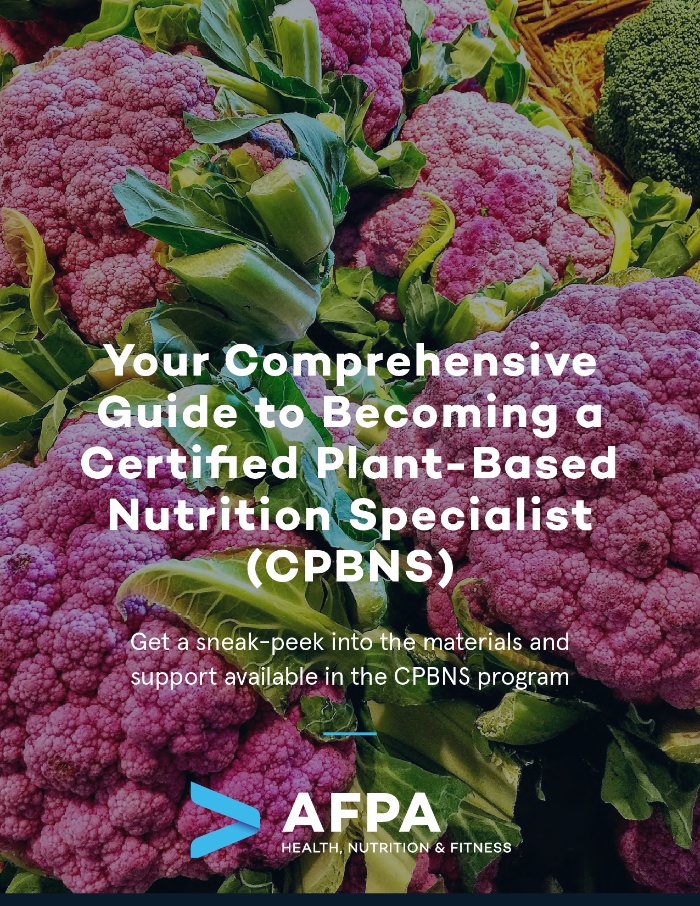A diet rich in whole or minimally processed plant foods offers numerous benefits to your health.
Research shows that high-quality, plant-based diets have the following health benefits:
- May help promote healthy blood sugar and insulin levels, in turn helping to prevent the development of type 2 diabetes
- Lowers the risk of heart disease
- Helps to reduce high blood pressure
- Reduces the risk of cancer
- Reduces overall mortality
Plant-based diets can help to support environmental health as well. If the majority of the population ate diets richer in plants and lower in animal products:
- Water, land, and energy use are diminished.
- Human-generated greenhouse gas emissions are reduced.
- Biodiversity could be preserved.
- Deforestation could be prevented.
It is clear there are benefits to consuming more plants and less animal-based foods and products. As a health, wellness, nutrition, and fitness coach, understanding and implementing key terms can help you to support and educate clients who have adopted or who are interested in adopting a plant-based dietary regimen.
In this article, we summarize the differences and similarities between plant-forward, plant-based, vegan, vegetarian, and other dietary patterns that focus on plant consumption. At the end of the article, you will find a glossary that summarizes the most common definitions of these terms for your own reference or to use as an educational tool for your clients.
A Note About the Use of the Term “Diet”
In popular jargon, the term “diet” is used to refer to a restrictive eating pattern, often one that a person takes on for a short period of time to achieve a certain health or aesthetic goal.
In the nutrition and wellness space, a diet is simply a pattern or a way of eating. Whatever you tend to eat on a daily, weekly, or monthly basis, that is what makes up your diet.
In this article, and throughout all of the articles on the AFPA blog, the term “diet” refers to a pattern of eating. The exception is if the article is referring to the name of a popular or fad diet that is, by nature, highly restrictive and meant to be followed for short periods of time.

Become a certified expert on plant-based nutrition and help others discover how this way of eating can lead to vibrant health and well-being.
Different Plant-Based Diets: Definitions and Descriptions
Vegetarian Diets
Vegetarian diets are those where meats, poultry, and fish are excluded from the diet. Other animal foods may be excluded as well. Some vegetarians, however, may regularly eat eggs (ovo-vegetarians), dairy (lacto-vegetarians), or even fish (pescatarians). In this sense, it is possible to be a vegetarian but still obtain a significant portion of your daily nutrients from animal-based foods.
Vegan Diets
Veganism avoids any foods sourced from animal-based products.
Often, but not always, veganism refers to a lifestyle rather than just an eating pattern. A vegan lifestyle is one where all animal-based products and products that involve animals in any way are completely avoided.
People who are vegan tend to not only avoid any animal-sourced foods, including eggs and dairy, but they also tend to avoid any products with raw materials from animals or where animals might have been hurt in the process. These other products include leather, suede, and beauty products with animal testing processes.
People may follow vegan diets for health reasons, environmental reasons, ethical reasons, or a combination.
Veganism is among the most restrictive plant-based regimens. Two other forms of veganism that are more limited in food choice include raw veganism, where vegans only eat uncooked plant-based foods, and a fruitarian diet, a type of raw veganism where most of the food eaten is fruit.
Plant-Based Diet
Plant-based diets are those where the diet as a whole is composed mostly of plant-based foods, and, as a result, nutrient needs are met mostly by plant-based products.
The term plant-based diet can be used generally to refer to all plant-based eating patterns, including veganism, vegetarianism, and a plant-forward diet. However, many people prefer to use the term “plant-based,” as opposed to vegan or vegetarian, due to key differences in what the different eating patterns entail.
Because of these variations, a plant-based diet doesn’t have a strict definition, and that is purposeful. The term signals a general pattern of eating, but it is not meant to be restrictive. For example, a person eating a plant-based diet may eat eggs a few times a week, or they may eat meat at a family member’s house for a special gathering.
However, it can be useful to have a clearer definition of a plant-based diet for research and educational purposes.
Several groups of researchers have attempted to define a plant-based diet, and the results have varied.
One of the most popular definitions of a plant-based diet is as follows:
A regimen that encourages whole, plant-based foods and discourages meats, dairy products, and eggs as well as all refined and processed foods.
This definition leaves a lot of wiggle room. It doesn’t necessarily exclude processed foods, ultra-processed foods, and energy-dense and nutrient-poor foods. Some dietitians and researchers differentiate a standard plant-based diet from a healthy plant-based diet, where the consumption of ultra-processed foods, drugs, and alcohol is minimized. One study highlighted how variations in plant-based diet patterns have an influence on cardiovascular health risks; plant-based eating patterns based on whole fruits and vegetables, legumes, and whole grains had better outcomes than those that consumed starchier and more overcooked or ultra-processed foods.
It is important to note that not all people who eat a plant-based diet, or who consider themselves vegetarians or vegans for that matter, follow the exact same eating patterns. Factors such as likes and dislikes, culture, and access all have an undeniable influence on what diets look like and how they are experienced.
Plant-Forward Diet
The American Heart Association defines a plant-forward diet as “a style of cooking and eating that emphasizes plant-based foods but is not strictly limited to them. Meat may be included, but it’s usually not the main feature of the meal.”
As this definition may sound very similar to a plant-based diet, Jada Linton, RDN LD, provides a wider definition of plant-forward as a movement rather than a specific diet.
“Plant-forward is the overarching umbrella term that includes a wide range of eating patterns. Plant-forward includes vegan, vegetarian, Mediterranean, and any other eating pattern that focuses on increasing fruit and vegetable consumption.”
This pattern of eating and this term have gained plenty of traction because the USDA 2020-2025 Dietary Guidelines recommend a plant-forward eating pattern. Some cultural patterns of eating, mainly in parts of Asia, Africa, Latin America, and the Mediterranean region, have been plant-forward for thousands of years. The consumption of meats and dairy as staples in the diet is a Western influence and relatively recent. In fact, several historical and social science researchers have shown that the psychology around meateating as it relates to class and income, rather than nutrition, has significantly influenced what we deem healthy.
Some people following a plant-forward eating pattern may identify with the term flexitarian. A flexitarian diet is one that is mostly vegetarian or plant-based but may consume meat and animal-based products occasionally.
Glossary of Terms
Keeping tabs on the different terms mentioned in this article may be confusing. To summarize, we’ve created a glossary of terms in alphabetical order you can refer to.
Fruitarian: A type of raw veganism where most of the food eaten is fruit.
Lacto-ovo-vegetarian: A vegetarian diet that includes dairy and eggs.
Lacto-vegetarians: A vegetarian diet that includes dairy.
Ovo-vegetarian diet: A vegetarian diet that includes eggs.
Pescatarian: A vegetarian diet that includes fish.
Plant-based diet: “Plant-based” refers to a dietary pattern that primarily consists of plants (i.e. fruits, vegetables, seeds, nuts, legumes, whole grains, etc.). While the program does cover different types of vegetarian and vegan diets, it also considers diets that include meat and other animal products.
Plant-forward movement or diet: The term that refers to a movement toward a wide range of eating patterns. Plant-forward includes vegan, vegetarian, Mediterranean, and any other eating pattern that focuses on increasing fruit and vegetable consumption.
Raw veganism: In addition to avoiding any products that involve animals in the process, raw vegans only eat uncooked plant-based foods.
Vegan diet: That which avoids any foods sourced from animal-based products.
Veganism: A lifestyle where animal products and products that may harm animals are avoided in the diet and in purchasing choices.
Vegetarian diets: Those where meats, poultry, fish, eggs, and dairy may be excluded from the diet.
Main Takeaways
Dietary guidelines worldwide are recommending that people consume more plant-based foods in place of animal-based foods. The focus is on fruits, vegetables, whole grains, nuts, and seeds rather than on refined grains and ultra-processed foods, which lose valuable nutrients in the process.
There are numerous dietary patterns that focus on plants rather than on animals. The terms mentioned here serve as educational and organizational tools to help you understand the different ways that people may adopt an eating pattern where they eat more nutrient-dense plant foods rather than animal foods.
If you or your client is looking to transition toward a plant-based diet, you can read this article on 8 Best Practices for Transitioning to a Plant-Based Diet on the AFPA blog for a quick read or download the AFPA Coaching Resource for Plant-Based Eating here.

Become a certified expert on plant-based nutrition and help others discover how this way of eating can lead to vibrant health and well-being.
References
- https://www.ncbi.nlm.nih.gov/pmc/articles/PMC3662288/
- https://academic.oup.com/advances/article/10/Supplement_4/S275/5624061?login=true
- https://www.sciencedirect.com/science/article/pii/B9780128039687000010
- https://www.tandfonline.com/doi/abs/10.2752/175174412X13190510222101
- https://www.rush.edu/news/health-benefits-vegan-diet
- https://www.medicalnewstoday.com/articles/raw-vegan-diet
- https://www.bbcgoodfood.com/howto/guide/what-fruitarian-diet
- https://www.ncbi.nlm.nih.gov/pmc/articles/PMC3662288/
- https://www.jacc.org/doi/full/10.1016/j.jacc.2017.06.006
- https://www.sciencedirect.com/science/article/abs/pii/S1050173818300240
- https://www.dietaryguidelines.gov/
- https://www.ncbi.nlm.nih.gov/pmc/articles/PMC6165406/



